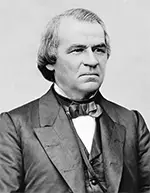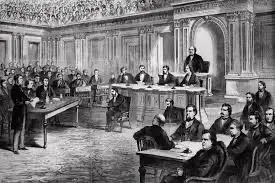The Impeachment of Andrew Johnson
Andrew Johnson was the first U.S. President impeached. This happened in 1868. Johnson had been the running mate of Abraham Lincoln when he ran for re-election in 1864. Lincoln, a Republican, had chosen Johnson, a Democrat, in order to present a semblance of balance on the presidential ticket. When Lincoln was assassinated in 1865, Johnson became President. Johnson inherited an ongoing dispute between the Executive Branch and the Legislative Branch. 
The dispute, which had its roots in the disillusionment many in Congress had over the end of the Civil War and the subsequent course of Reconstruction, centered on the Tenure of Office Act, which Johnson continued to assert was unconstitutional and which Congress had passed in order to gain some control of the president, whom they thought a maverick. Johnson, like Lincoln, wanted more leniency toward the South; a majority of the Congress wanted harsher measures. From these arguments came a growing resentment on both sides. In March 1867, Congress passed the Tenure of Office Act, which stipulated that the president could not fire federal appointees, including Cabinet members, without consent from the Senate, which would have approved those appointees in the first place. Secretary of War Edwin Stanton, a holdover from President Abraham Lincoln's cabinet, was increasingly volatile in his criticism of Johnson and made his view public. Stanton also sided with the Radical Republicans and used his office to stall Johnson's Reconstruction policies as much as possible. Johnson fired Stanton, and the constitutional struggle was on. Article II, Section 4 of the U.S. Constitution reads thus: "The President, Vice President and all civil Officers of the United States, shall be removed from Office on Impeachment for, and Conviction of, Treason, Bribery, or other High Crimes and Misdemeanors." In impeachment proceedings, the members of the House of Representatives serve in the role of a grand jury, deciding whether to bring an indictment against a particular individual. If a simple majority of the House votes for such an indictment, then the individual faces charges of impeachment. Such charges as referred to as Articles of Impeachment. The next step is a trial, and the people deciding the individual's guilty or innocence are the members of the U.S. Senate. The Chief Justice of the United States presides over an impeachment trial. If a two-thirds majority of the Senate votes to convict the individual facing impeachment, then the individual is convicted and removed from office. The Senate can further, by a simple majority, declare that the convicted individual can never again be eligible to hold public office. 
Johnson had vetoed the Tenure of Office Act but had been overridden by a determined Congress. Johnson's firing of Stanton spurred the House into action, and soon Johnson was facing 11 articles of impeachment, on charges of violating the Tenure of Office Act–in effect, breaking the law. Under the U.S. Constitution, the House votes to impeach and the Senate votes to convict. So, technically, Johnson was impeached, then his case went to the Senate. At the end of an impassioned two-month trial, the Senate on May 16, 1868, voted 35-19 to convict. They needed 36 in order to get the two-thirds required by the Constitution. By a one-vote margin, Johnson kept his job. The Tenure of Office Act was later declared unconstitutional by the Supreme Court. |
|
Social Studies for Kids
copyright 2002–2024
David White





